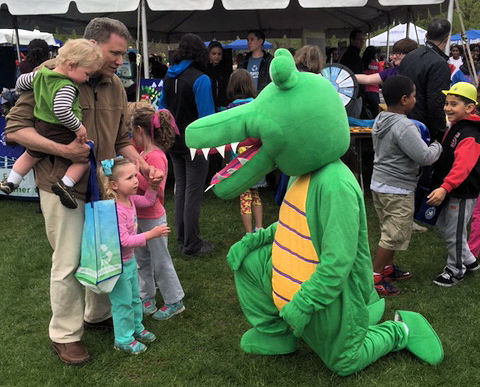
WEFCOM mascot Niles the Crocodile visits children during the Alexandria, Va., Earth Day event. Water Environment Federation (WEF; Alexandria) photo/Kelsey Hurst.
Every spring in celebration of Earth Day and World Water Day, the Water Environment Federation’s (WEF; Alexandria) staff volunteer environmental group, WEFEco, reaches out to the local community. This year, WEF participated in both an Earth Day event and the Commuter Challenge in Alexandria, Va.
Reaching out to the community
On April 25, staff volunteer Jessica Rozek led the effort to set up a water-education booth for Alexandria Earth Day at Ben Brenman Park. Kristina Twigg and Rebecca Arvin-Colon developed activities for the event. Seven other staff members also volunteered. The booth featured a prize wheel and two educational activities, as well as WEFCOM mascot, Niles the Crocodile.
“Niles was a huge hit with the children. He rocked out with one of the bands, played soccer with the kids, and got at least 50 hugs,” Twigg said. Attendees could spin the prize wheel to get water- and WEF-themed pencils, backpacks, water bottles, piggy banks, activity books, and pins.
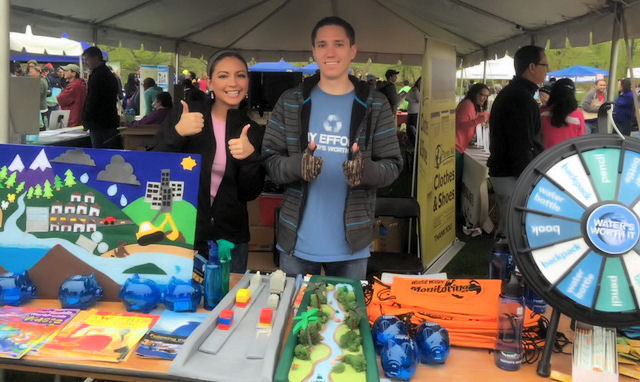
From left, WEF staff Marisa Tricas and Patrick Loper help children and adults participate in water-quality educational activities. WEF photo/Hurst.
WEF staff also led booth visitors through watershed and water cycle activities. For children to learn about watersheds, an urban watershed model was made from Lego buildings and tile, and a natural watershed model was made of Legos, clay, rocks, and moss. The children were also topped off with some roof maintenance tips for the watershed because the staff felt imperative that this knowledge be imparted, for a caved roof would be no good. Children used a spray bottle to simulate rain and had to answer which landscape absorbed the most water.
“Many kids guessed that the urban watershed would soak up the most water, but they soon found out that less runoff was produced in the natural watershed. The vegetation helped to slow and soak up the runoff, and the meandering stream reduced its energy,” Twigg said.
The water cycle activity featured a model depicting such water stages as precipitation, groundwater, and water and wastewater treatment, as well as various activities that could affect water quality, including agriculture, construction, urban areas, and pet waste. WEF staff used the activity to interact with the community and educate about wastewater, water treatment, water quality, and interconnection of the water cycle.
“Most importantly, children at the Alexandria Earth Day event were having a great time, which they will hopefully connect, even if it is subconsciously, with environmentally friendly behavior,” Twigg said.
Prize recognizes WEF efforts to reduce pollution

WEF staff member Jessica Rozek bikes to work during the 2015 City of Alexandria Commuter Challenge. WEF photo/Rozek.
Rozek also coordinated WEF’s participation in the City of Alexandria Commuter Challenge. A total of 32 staff members took part in the 2-week challenge to take alternative forms of transportation to work. Instead of driving alone, staff members were challenged to walk, bike, carpool, telework, or take public transportation. They logged their commutes online daily, and the city calculated the environmental benefits of all participating companies to determine overall winners.
WEF staff won the Silver Prize for the 2015 Commuter Challenge by reducing the total distance staff members traveled by 7276 km (4522 mi) and associated pollution by 2 Mg (2.27 tons). Together they saved 681 L (180 gal) of fuel and $2560 in transportation costs. WEF contributed about 8% of the city’s total reduction of 94,017 km (58,432 mi) traveled, 25.5 Mg (28.09 tons) of resulting pollution, 8399 L (2219 gal) of fuel use, and $31,664 in transportation costs, according to the Commuter Challenge website.
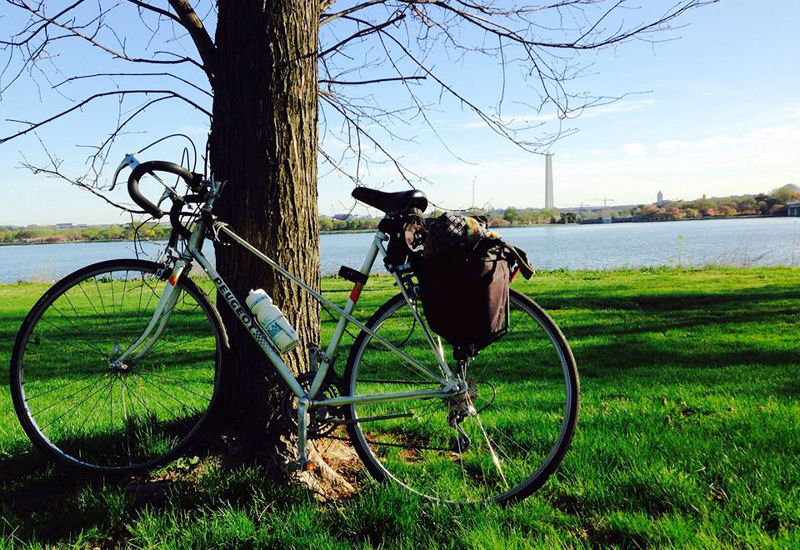
WEF staff took public transportation, carpooled, walked, biked, and teleworked to help win the Silver Prize for the 2015 City of Alexandria Commuter Challenge. WEF photo/Rozek.
Since WEF launched its Low Carb(on) Diet initiative in mid 2007, it has installed a green roof and terrace and energy-saving equipment at its headquarters, promoted public transportation use, increased recycling and use of recycled or reusable materials, disseminated green-lifestyle information to staff, and hosted five annual service projects to get WEF out into the community.
For more information about WEF’s efforts to represent the value of water message, read the following WEF Highlights articles:
- “WEF Staff Share the Value of Water Message with Local Students,” published in 2014;
- “Walking the Talk for Water,” published in 2013;
- “WEF Staff Support WATER’s WORTH IT™ Message With Action,” published in 2012;
- “WEF Staff Makes a Splash in Celebration of Earth Day 2011,” published in 2011;
- “WEF Staff Mark Storm Drains for Earth Day,” published in 2010; and
- “WEF Completes Construction of Green Roof and Green Terrace,” published in 2009.
— Jennifer Fulcher, WEF Highlights


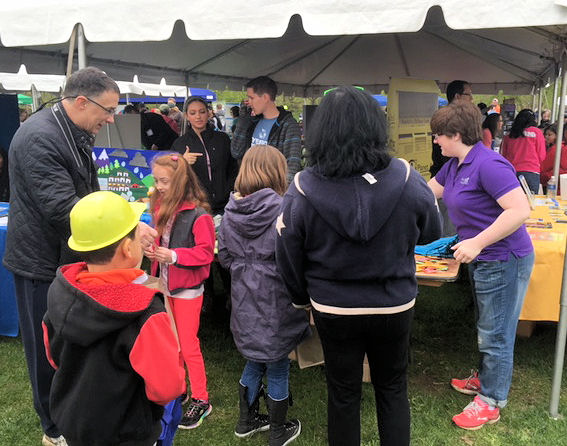
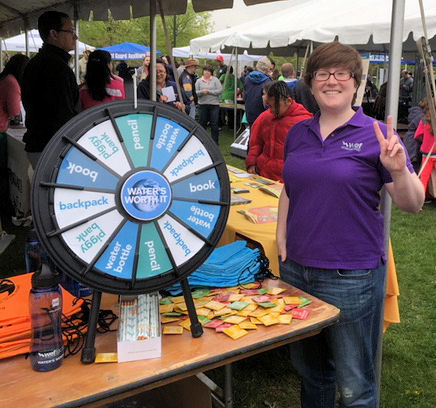






June 30, 2015
Featured, WEF Resources & Efforts